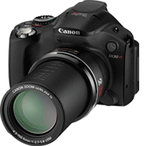Ricoh Caplio GX200
A super wide-angle high performance 24-72 mm/f2.5 (wide) - f4.4(telephoto) zoom lens with superb optical performance comparing favorably to SLR interchangeable lenses. Attach the unique tilting electronic viewfinder, linked to the focal distance to zoom and frame your subject with the feel of an SLR or medium format camera and add GX200 host of versatile accessories to enter a wider realm of creative photography. For the photographer who knows the depth and joy of photographic expression, the GX200 transcends the limitations of a compact camera.
The optical 3x super-wide zoom lens, effectively controls curvature aberration, boasts superior resolution and high contrast.
It is the "eye" of the GX200, achieving both compactness and depiction ability at a high level by employing aspheric, special low-dispersion glass and high refractive index low-dispersion lens elements.
Through fine tuning, it controls flare that can occur when shooting backlit subjects compared to GX100.
Superior optical performance is exhibited regardless of lighting conditions and focal length.
Sharp images all the way to the picture's edge with natural gradations and coloration even in high-sensitivity shooting situations: that is the power of the Smooth Imaging Engine III image processor. With thorough noise reduction measures in both its circuit design and algorithms, the GX200 effectively eliminates noise without sacrificing resolution or saturation.
A 1/1.7" CCD with 12 megapixels faithfully reproduces the world as seen. The result is superb images high in resolution and low in noise, with rich gradation expression from highlight to shadow.
The noise reduction function can switch settings according to the shooting environment. Since the noise reduction can be set to turn on at a specific ISO sensitivity level-such as ON for ISO401 and above-noise reduction can be fine tuned to the photographer's style.
The macro function brings the camera to the subject, with a minimum distance of 1 cm in wide angle and 4 cm in telephoto. Not just point and shoot those flowers and insects large, the GX200 offers a wide range of creative intentions, such as emphasizing perspective using wide-macro and making the theme conspicuous by blurring the background using tele-macro. There is also a zoom macro capability for greater magnification than is possible with standard macro functions. Convenient for fine tuning focus and exposure when a tripod is used, the AE/AF target shift function greatly expands the pleasures of close-up photography.
The AE/AF target can be shifted in both macro and normal shooting. Focusing and exposure setting can be done independently by shifting either the AE or AF target to the position anywhere on the screen you want it. And spot AE at the focused position is also possible by shifting the AE and AF targets simultaneously. This function comes in handy when the camera is fixed to a tripod.
The new high-resolution LCD display vividly presents image detail. The wide field of view (160 degrees both vertically and horizontally) gives the feel of "free angle" shooting, and the high contrast gives great visibility even outdoors. The 1/20-size image display function looks great on the high-definition screen and is convenient for quickly finding one image among many.
With "My Setting" mode, frequently used shooting settings can be preset and switched to in an instant. With the GX200, the number of options has been expanded to three. It is also possible to change the shooting mode from the shooting menu, so there is no need to go to the trouble of revising custom settings each time.
Two Fn (function) buttons enable direct changes reflecting the photographer's preferences. One-push mode change functions are assigned to each button. For instantaneous switching, pre-select and register frequently used functions such as picture quality mode and AF mode. Don't let sudden photo chances get away.
Keeping the camera level with respect to the subject is a basic requirement for making full use of a wide-angle lens. That's why the GX200 has an internal electronic leveller which lets you view the horizontal or vertical indicator while watching the LCD display. The photographer can quickly ensure that shots are aligned horizontally and vertically. The level indicator can also be viewed with the electronic viewfinder (in both normal and tilted positions). This makes it possible to concentrate on shooting without taking your eye off the subject.
With its new high-volume buffer memory, the GX200 can do exposure auto bracketing and continuous shooting of up to five images, even in high-image-quality RAW, giving shooting abilities approaching SLR levels.
For playback mode, it is possible to define in advance where to first display the image: on the electronic viewfinder or the LCD display. Even when checking images without taking your eye from the camera to eliminate the influence of ambient light, there is no nuisance of having to use the VF/LCD button each time to make a switch.
Horizontal or vertical? The camera position is detected during shooting and that information is added to the image. This makes it possible to automatically rotate the image to the correct orientation for the position of the camera during playback.
If there is overexposure at the set aperture value when in aperture priority mode, the aperture value can be automatically adjusted. You can just leave it to the camera in times such as when the subject moves between shadow and sunlight or the weather changes suddenly.
Even in scenes with backlighting and extreme contrast, by automatically controlling brightness distribution, the GX200 limits whiteout while reducing loss of detail in dark areas. This makes it possible to create natural-looking images closer to what the eye sees. With rich gradations in areas of both high and low brightness, this function meets the expectations of the photographer's aesthetic vision. Compensation can also be done in playback mode.
The GX200's high-performance optics compensate for distortion well. But a distortion compensation function is also provided if image distortion is still a problem. That way you can more easily enjoy the attraction of wide-angle lens. The function can be turned on or off at will. And it also exhibits its abilities when a wide conversion lens is attached.
In addition to auto shooting mode for easy snap shooting with the camera taking care of the settings, the exposure modes A (aperture priority mode), M (manual exposure mode), and P (program shift mode) offer many options for creative photography.
Light intensity of the built-in flash can be adjusted across a wide range (-2 to +2 EV). This is helpful for controlling subject-background balance in both macro and normal shooting situations. Moreover, manual flash where light intensity is freely set (in 1/2 EV increments) is also possible. And you can enjoy a range of creative flash photography such as rear curtain and front curtain synchronization, which are useful for creating a trail of light in the image.
Using the B&W (TE: Toning Effect) settings, fascinating duotone-style monochrome works are possible. Color choices for toning effects are red,blue, green, sepia, or purple; and color depth, contrast, and sharpness can also be adjusted.
With one shutter push, three images-color, B&W, and B&W (TE)-are recorded. Works with a diverse feel can be easily created without post-shooting image processing.
White balance is a major factor in determining coloring and the impression that a photograph makes. The GX200 allows for fine tuning of the white balance compensation when taking pictures while viewing the LCD display or electronic viewfinder. Compensation can be done on the blue/amber or magenta/green scales according to the light source. Compensation can also be done in playback mode.
In addition to 4:3 and 3:2 aspect ratios, 1:1 square format photography is also possible. Combined with the electronic viewfinder with its tilt mechanism, the GX200 gives the feel of shooting with a medium format camera. Enjoy framing 6x6 film style compositions.
The CCD-shift-type image stabilizer demonstrates its power in dark scenes, enabling hand-held shooting of sharp images with minimum hand-motion blur. This is, of course, very helpful for shooting in places where flash use is prohibited, but it can also be effective for creating atmospheric shots in natural light. In addition, if ISO sensitivity is set to "AUTO-HI," the camera will automatically raise the ISO sensitivity based on the scene. This can result in a faster shutter speed, which is useful for preventing image blurring.










